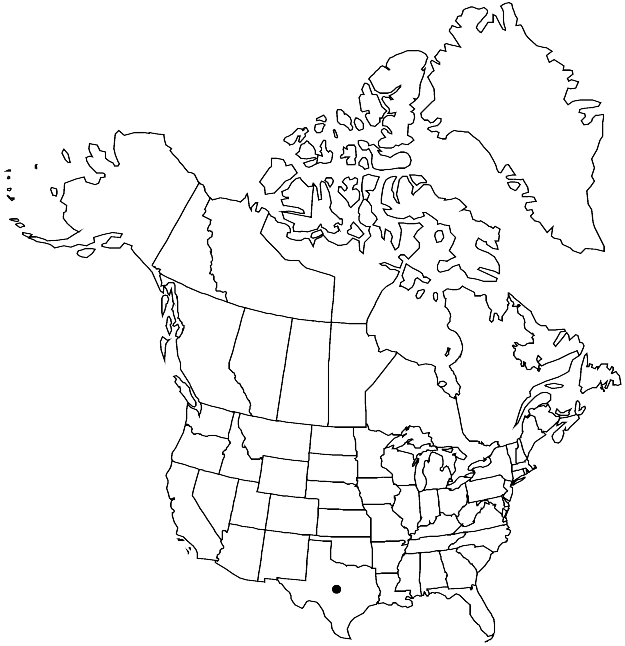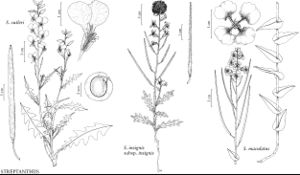Difference between revisions of "Streptanthus cutleri"
Rhodora 45: 259. 1943.
FNA>Volume Importer |
imported>Volume Importer |
||
| (6 intermediate revisions by 2 users not shown) | |||
| Line 6: | Line 6: | ||
|place=45: 259. 1943 | |place=45: 259. 1943 | ||
|year=1943 | |year=1943 | ||
| + | }} | ||
| + | |special_status={{Treatment/ID/Special_status | ||
| + | |code=F | ||
| + | |label=Illustrated | ||
| + | }}{{Treatment/ID/Special_status | ||
| + | |code=C | ||
| + | |label=Conservation concern | ||
}} | }} | ||
|basionyms= | |basionyms= | ||
| Line 24: | Line 31: | ||
|distribution=Tex.;Mexico (Coahuila). | |distribution=Tex.;Mexico (Coahuila). | ||
|discussion=<p>Of conservation concern.</p><!-- | |discussion=<p>Of conservation concern.</p><!-- | ||
| − | --><p>In Texas, Streptanthus cutleri is restricted to the Big Bend area in Brewster County.</p> | + | --><p>In Texas, <i>Streptanthus cutleri</i> is restricted to the Big Bend area in Brewster County.</p> |
|tables= | |tables= | ||
|references= | |references= | ||
| Line 33: | Line 40: | ||
-->{{#Taxon: | -->{{#Taxon: | ||
name=Streptanthus cutleri | name=Streptanthus cutleri | ||
| − | |||
|authority=Cory | |authority=Cory | ||
|rank=species | |rank=species | ||
| Line 47: | Line 53: | ||
|publication title=Rhodora | |publication title=Rhodora | ||
|publication year=1943 | |publication year=1943 | ||
| − | |special status= | + | |special status=Illustrated;Conservation concern |
| − | |source xml=https:// | + | |source xml=https://bitbucket.org/aafc-mbb/fna-data-curation/src/2e0870ddd59836b60bcf96646a41e87ea5a5943a/coarse_grained_fna_xml/V7/V7_1226.xml |
|tribe=Brassicaceae tribe Thelypodieae | |tribe=Brassicaceae tribe Thelypodieae | ||
|genus=Streptanthus | |genus=Streptanthus | ||
Latest revision as of 22:31, 5 November 2020
Annuals; glabrous throughout. Stems (simple from base), usually branched distally, 2–7 dm. Basal leaves subrosulate; petiolate; blade oblanceolate, 2.5–20 cm, margins runcinate-pinnatifid. Cauline leaves (petiolate); blade oblanceolate, 4–20 cm × 10–70 mm, (smaller distally), base not auriculate, margins runcinate-pinnatifid (undivided, usually entire distally). Racemes ebracteate, (lax). Fruiting pedicels divaricate-ascending, (5–)10–27 mm. Flowers (strongly zygomorphic); calyx campanulate; sepals (ascending), dark purple, 8–12 mm, not keeled; petals lavender to purple-lavender, (in 2 unequal pairs), abaxial pair undifferentiated into blade and claw, 5–6 mm, margins crisped, adaxial pair 15–26 mm, (not crisped), claw 7–11 mm, crisped, narrower than blade; stamens in 3 unequal pairs; filaments distinct: abaxial pair 6–7 mm, lateral pair 3–5 mm, adaxial pair 8–12 mm; anthers: abaxial and lateral pairs fertile, 4–5 mm, adaxial pair fertile, 3–3.5 mm; gynophore 0.2–0.5 mm. Fruits ascending, smooth, straight, strongly flattened, 3.2–7.5 cm × 4–5 mm; valves each with prominent midvein; replum straight; ovules 30–46 per ovary; style 0.2–0.5 mm; stigma 2-lobed. Seeds orbicular, 3–4 mm diam.; wing 0.5–1 mm wide, continuous.
Phenology: Flowering Feb–Apr.
Habitat: Talus slopes, rocky hillsides, gravelly and dry stream beds, sand flats, limestone slopes, open scrub or woodland
Elevation: 400-700 m
Distribution

Tex., Mexico (Coahuila).
Discussion
Of conservation concern.
In Texas, Streptanthus cutleri is restricted to the Big Bend area in Brewster County.
Selected References
None.
